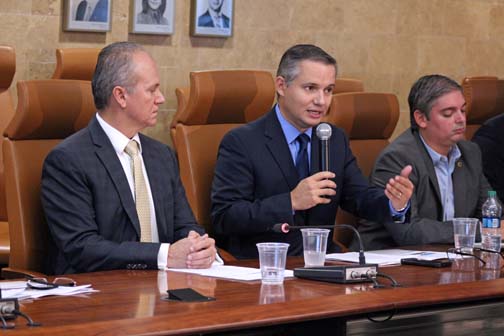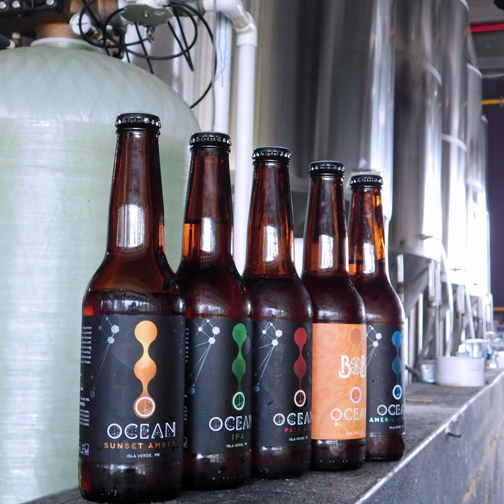MIDA: 2 mo.’s after Hurricane María, container backlog, product shortages persist


From left: MIDA President Ricky Castro and Vice President Manuel Reyes-Alfonso.
More than two months after María made history as one of the most destructive hurricanes to hit Puerto Rico in 80 years, the island is still experiencing a backlog of containers at the ports that translate into shortages at grocery stores, members of the Puerto Rico Chamber of Food Marketing, Industry and Distribution (known as MIDA by its Spanish acronym) confirmed.
The problem is attributed to a lack of space on cargo ships and fewer containers and trucks to transport the goods from the ports to the retailers, MIDA members stated.
As a result, during the months of September and October there was an increase of 41 percent on “out of stock” goods, which peaked at more than 50 percent in mid-October, said Francisco Cabrero, president of research firm Market Research Professional, which measured the situation by the numbers.
During a news conference Tuesday, MIDA executives recapped how the problem has evolved in the weeks after Hurricane María made landfall on Sept. 20.
Immediately after María pulled away from Puerto Rico, grocery stores began reopening with power generators to sell whatever merchandise they had left on the shelves. However, three weeks after the storm, difficulties to re-stock lead to the creation of a work group at the government’s Emergency Command Center to identify problems and provide solutions.
“From those meetings it was clearly documented that one of the biggest problems was the lack of space on ships due to increased merchandise that was attempting to arrive to the island,” said MIDA President Ricky Castro.
“Given this situation, the shippers were obliged to prioritize what could or could not get on the boats, which in itself is a confirmation that there wasn’t the necessary space to meet the new demand,” he said.
“However, in the committee’s initial meetings, we were asked to document the situation, and 15 companies alone had some 1,400 containers being held back in the U.S. mainland, a figure that increased to 1,700 the next week,” said Castro, adding the numbers were not meant to measure the magnitude of the problem industry-wide.
Following “significant pressure,” MIDA Vice President Manuel Reyes-Alfonso said shiping companies agreed to add capacity with more ships and equipment, which “validated the problem was real.”
The problem was also compounded by the Federal Emergency Management Agency’s need for space on the cargo ships, which affected Puerto Rico’s retail chain. Still, after more than two months, the problem remains with some 2,032 delayed containers contracted to supply the needs of 10 companies, Reyes-Alfonso said.
Another problem plaguing the sector is a shortage of equipment — containers and trucks — as well as truck drivers in the U.S. mainland and Puerto Rico to move the heightened crisis-induced demand for goods, said Angel Vázquez, president of B. Fernández y Hermanos.
However, Econo supermarkets President Eduardo Marxuach said these difficulties are out of their hands.
“Our goal is to clarify that the industry had contingency plans and has been reacting immediately to consumer demand. However, there are difficulties that are not under our control,” said Marxuach, adding “consumers have been affected, but retailers also lose sales because they don’t have all the goods consumers need.”
“Unfortunately the consumer can only see the last link in a long chain and is not aware of where the problems are,” said Antonio Colón, president of Centro Ahorros supermarkets.
“However, despite all these difficulties, during this emergency, the food industry has not only supplied supermarkets and restaurants, it has been primarily responsible for aid and food donations, helping with millions of dollars in contributions for local, municipal, and federal governments, and nonprofit entities,” said Mayreg Rodríguez, executive director of Supermercados Selectos.
The ‘perfect storm’ of problems
Meanwhile, the trade group stressed that the shipping sector’s delayed reaction is due to the limitations imposed by the Jones Act. MIDA members also acknowledged that the demand for cargo space and equipment will die down, but believe it should be “on public record” that goods needed for Puerto Rico’s quick recovery have been slow to arrive due to a lack of space on ships and an equipment shortage.
They also said the 10-day Jones Act waiver granted in September should have been extended. Furthermore, they claimed that to minimize this situation in the future the government will have to remove or replace the municipal tax on inventories.
“If we had higher inventories, we would rely less on the agility of transportation systems,” said Debbie Alonso, of the Mr. Special supermarket chain.
“MIDA has spent decades explaining the danger of the public policy that penalizes companies for having significant inventories, as well as the risks associated with the Jones Act, and unfortunately, what for many was highly unlikely, happened,” Castro said. “Puerto Rico must learn from the fiscal crisis and this weather emergency to make the decisions that we’ve postponed for so long.”
Finally, MIDA members denied reports that they were leaving uncollected goods at the Port of San Juan.
“Although there may always be exceptions, the vast majority of importers need to get the goods out as soon as possible because consumers are waiting. It would be contrary to our best interests,” said Sammy Ramos, president of GMT.
The group also emphasized that Puerto Rico is not experiencing a supply shortage in which citizens will starve.
“The situation on the shelves has been improving and although we still have limitations, there are always substitute products to meet customer needs,” said Félix Aponte, president of Supermercados Agranel.












